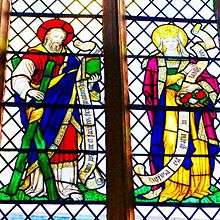Psalm 45

Psalm 45 is the 45th psalm from the Book of Psalms. According to Siddur Avodas Yisrael, it should be recited as an additional "Psalm of the Day" on Sabbath Parshat Chayei Sarah. It was written by the sons of Korach on (or "according to") the Shoshanim. Shoshanim, which means "lilies," may be either a musical instrument[1] or the tune to which the psalm should be sung.[2] The poem is a wedding song, or epithalamium, written to a king on the day of his wedding to a foreign woman, and is one of the Royal Psalms.[3]
Background and composition
In the 19th century, Franz Delitzsch argued that the poem was written on the occasion of Jehoram of Judah's marriage with Athaliah, while Alexander Kirkpatrick maintained that it referred rather to the marriage of Solomon with an Egyptian princess.[4]
The psalm has frequently been interpreted as a Messianic prophecy.[5] In Hebrews 1:8-9, verses 6-7 are quoted as allusions to Jesus, and among Jews as well the king has been identified with the Messiah and the bride with Israel.[6]
Note that the verse marking for this psalm in the Revised Standard Version (RSV) differs from that used in other translations.[7]
Contents
The Psalm consists of two sections framed by an introduction (vss. 1-2) and final blessing (vss. 17-18). Verses 3-10 enumerate the virtues of the king,[3] while verses 11-16 describe the queen's wedding procession and urge her to forget her family and her own country and to submit to her husband.[8] In verse 3, the poet tells the king that "God has blessed you from eternity," a concept known as predestination.[9] The most controversial passage is verse 7 (6 in the RSV), traditionally translated "thy throne, O god, is for ever and ever,"[10][11] because it seems as if the poet is addressing the king as "god," which is theologically problematic.[12][13] Alternate translations include "your divine throne endures for ever and ever"[6] and "the eternal and everlasting God has enthroned you."[7] The last two verses of the psalm assure the king that he will have a long line of descendents and "peoples will praise you from age to age."[14]
It is a Psalm by the "sons of Korah"[15] and represents a song for the wedding of the king. The sons of Korach, to which the psalm is attributed in the 1st verse, were probably a race of temple singers. [16][1] Psalm 45 is the only example of profane poetry in the Psalms and was composed and sung by a minstrel or cult prophets on occasion of the marriage of the king. [17]
Construction
The Psalm covers 5 parts:
- Verse 1-2: Introductory Self-Presentation of the singer
- Verse 3-10: portrayal of the king in all his properties and in his power and wealth
- Verse 11-13: Addressing the Bride of the King
- Verse 14-16: Description of the bride
- Verse 17-18: completion of the song with the encouragement of a promise to the king and his descendants
Uses
New Testament
Verses 7 and 8 are used In the Book of Hebrews chapter 1.
Among Catholics
Since the early Middle Ages monasteries have traditionally performed this psalm was during the celebration of matins lundi, according to the Rule of St Benedict of Nursia (530).[18][19] In modern times in the Liturgy of the Hours, Psalm 45 is sung or recited, in two parts, with the Vespers on Monday of the second semaine [20] and office midday Saturday of the fourth week.
Notes
- ↑ The Artscroll Tehillim page 90
- ↑ Kirkpatrick 245
- 1 2 Dahood 270
- ↑ Kirkpatrick 243-244
- ↑ Kirkpatrick 244
- 1 2 Rhodes 78
- 1 2 Dahood 269
- ↑ Rhodes 79
- ↑ Dahood 271
- ↑ Kirkpatrick 247
- ↑ Dahood 273
- ↑ Kirkpatrick 247
- ↑ Dahood 273
- ↑ Dahood, 270, 276
- ↑ 2 Chronicles 20:19.
- ↑ Stuttgarter Erklärungsbibel. (Aufl. 1992, Deutsche Bibelgesellschaft Stuttgart), p.697 & 699 ISBN 3-438-01121-2, 2.
- ↑ Die Bibel mit Erklärungen. ISBN 3-7461-0069-0, 3. (Evangelische Haupt-Bibelgesellschaft, Berlin 1993)
- ↑ Psautier latin-français du bréviaire monastique, p. 167, 1938/2003
- ↑ Prosper Guéranger, Règle de saint Benoît, (Abbaye Saint-Pierre de Solesmes, réimpression 2007) p. 46,
- ↑ [archive of abbaye-montdescats
References
- Dahood, Mitchell (1966). Psalms I: 1-50. Anchor Bible Series. Garden City, New York: Doubleday & Company.
- Kirkpatrick, A. F. (1901). The Book of Psalms. The Cambridge Bible for Schools and Colleges. Cambridge University Press.
- Rhodes, Arnold B. (1960). The Book of Psalms. The Layman's Bible Commentary. Richmond, Virginia: John Knox Press.
Further reading
- Brooke Lemmons Deal (2007). Divine Queenship and Psalm 45. ProQuest. ISBN 978-1-109-08292-0.